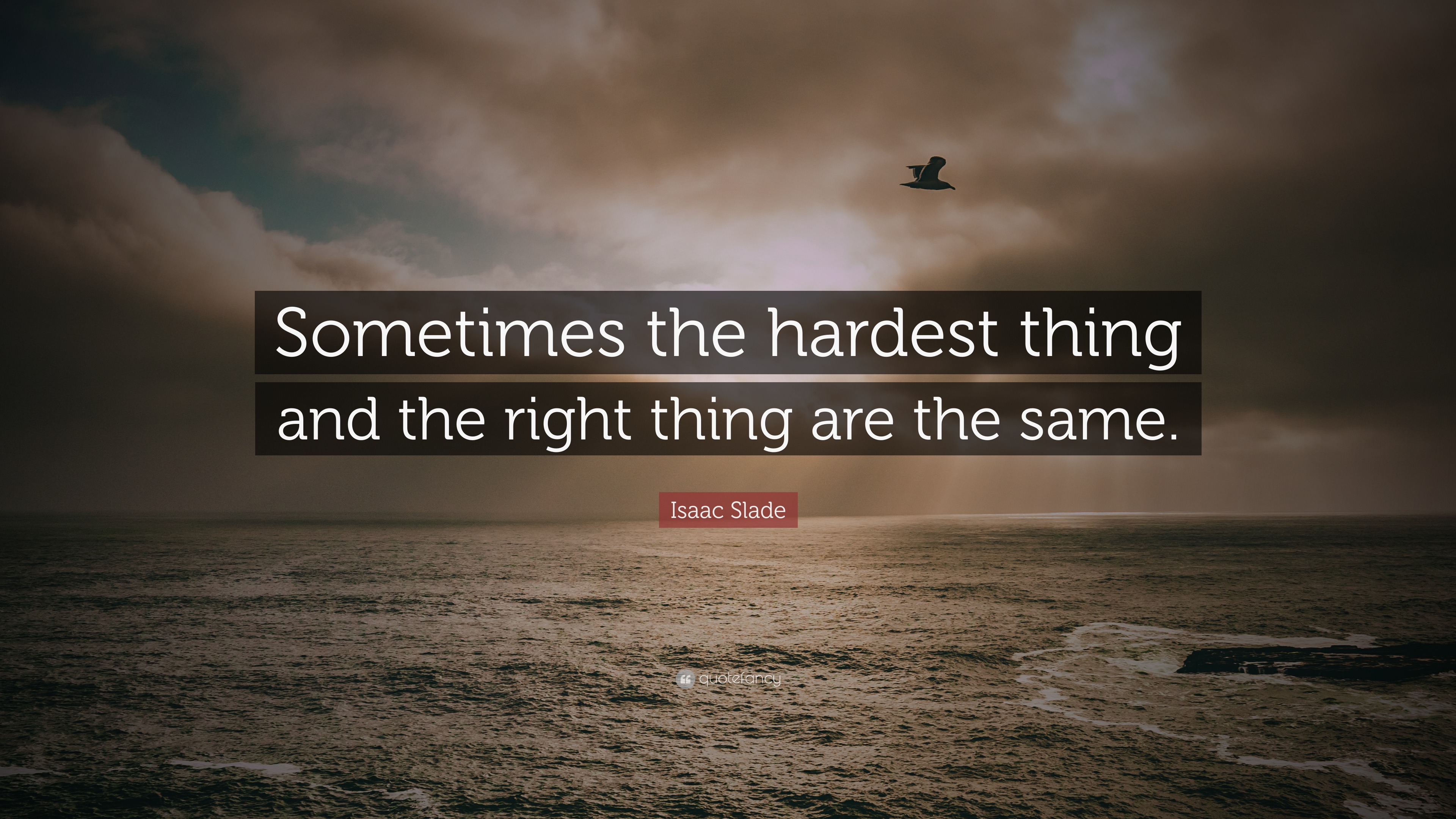Sometimes The Right Way Is The Hardest Way: Finding Strength In Tough Choices
Have you ever stood at a crossroads, feeling the pull of two paths? One seems smooth, inviting, maybe even a bit too easy. The other, though, feels like an uphill climb, full of rocks and unexpected turns. That second path, the one that asks more of you, is very often the one that leads to the most meaningful outcomes. It’s a curious thing, isn't it, how the best way forward can also be the most challenging?
This idea, that sometimes the right way is the hardest way, echoes through so many parts of our daily existence. It’s not just about grand, life-altering decisions; it's also about the smaller, quieter choices we make every single day. We are, you know, constantly weighing what's easy against what's truly good for us, or for others around us.
Thinking about this, it’s almost like the word "sometimes" itself holds a little bit of this truth. "Sometimes" means 'not always or not often,' so it reminds us that while this principle holds true at times, it isn't every single moment. But when it does appear, when that difficult but correct choice presents itself, that is when we really get to show what we are made of.
- Road Closures In Kansas
- La County Fair Map
- How Do I Order Checks From Chase
- Mastiff Mix Dogs
- Best Blue Oyster Cultongs
Table of Contents
- Why the Right Path Often Feels Tough
- The True Value of Difficult Choices
- How to Walk the Hard Road with Purpose
- The Rewards of Perseverance
- Frequently Asked Questions (FAQs)
- Taking the Next Step
Why the Right Path Often Feels Tough
It’s a common human experience, this feeling that the path of integrity or growth is the one with the most resistance. Why is that, you might ask? Well, for one, the right way often demands something significant from us. It could be patience, a quality that is actually quite rare in our fast-paced world. It could also mean delaying immediate gratification for a bigger, more distant reward, which is pretty much the opposite of what our instincts often tell us to do.
Sometimes, too, the right way involves confronting uncomfortable truths. This might mean admitting a mistake, apologizing, or even letting go of something we thought we wanted. These actions, while necessary for true progress, are often very, very uncomfortable. We tend to avoid discomfort, so it's natural to shy away from paths that promise it.
There's also the element of uncertainty. The easy way often feels predictable, like a well-worn groove. The harder, right way, though, can feel like stepping into the unknown. It might not have clear signposts, and that lack of immediate clarity can be a bit unsettling. As a matter of fact, sometimes you think you can’t really trust anybody, and that feeling of isolation can make a difficult path seem even more daunting.
Consider, for example, the plans we sometimes make. The plans sometimes symbolize more than they explain, especially where large black surfaces. This suggests that the true depth and difficulty of a path aren't always visible on the surface. What looks simple on paper can hide layers of effort and challenge, making it a difficult choice to truly commit to.
The True Value of Difficult Choices
When we choose the harder, right way, we are, in a way, investing in ourselves. This kind of choice builds character, for sure. It strengthens our resolve and teaches us about our own capacity for resilience. Think about it: every time you push through a tough spot, you discover a new layer of inner strength you didn't even know you possessed. That is, truly, a powerful thing.
These challenging paths often lead to deeper learning. When things are easy, we tend to glide through, not really paying close attention. But when we face obstacles, we are forced to think, to adapt, to innovate. We learn so much more from our struggles than from our effortless successes. It's like, you know, when you're trying to figure out how to use sometimes in a sentence; the effort you put into understanding its nuances helps it stick in your mind.
Moreover, choosing the difficult but correct path often brings a sense of profound satisfaction. There's a unique pride that comes from knowing you didn't take the easy way out, that you stuck with something important even when it was really tough. This feeling is, honestly, a reward in itself, something that an easy path just cannot provide.
It is good that we sometimes be contradicted, and ill though of, and that we always bear it well, even when we deserve to be well. This quote, in a way, speaks to the value of facing opposition or discomfort for a greater good. It suggests that enduring these challenges, even when we feel wronged, builds a kind of inner fortitude that is incredibly valuable.
How to Walk the Hard Road with Purpose
So, how do we actually do this? How do we keep going when the right way feels like an endless uphill battle? It’s not always simple, but there are a few things that can really help.
Knowing Your 'Why'
Before you even start, it's pretty important to understand why you're choosing this particular path. What is the ultimate goal? What values are you upholding? When you have a clear sense of purpose, it acts like a compass, guiding you through the murkiest parts of the journey. This 'why' is your anchor when things get rough.
Breaking It Down
A large, difficult task can seem absolutely overwhelming. It’s almost like trying to eat an entire elephant in one sitting. The trick, then, is to break it down into much smaller, manageable steps. Focus on just the next step, then the one after that. This makes the journey seem less daunting and more achievable, honestly.
Seeking Support
You don't have to do it all alone. Find people who believe in you, or who have walked similar paths. Their encouragement and advice can be incredibly valuable. Sometimes, just knowing someone else understands what you're going through makes a huge difference. You know, like your friends who cheer you on when you're trying something new.
Celebrating Small Wins
The journey might be long, but every little step forward is a victory. Take a moment to acknowledge these small achievements. This helps keep your spirits up and reminds you that you are, actually, making progress. It’s a bit like refueling your motivation tank along the way.
The Rewards of Perseverance
When you stick with the difficult, right path, the rewards are often far greater than anything the easy road could offer. You gain a deep sense of accomplishment, for one. This isn't just a fleeting feeling; it's a solid, lasting pride in what you've overcome. It's the kind of satisfaction that really stays with you.
You also build incredible resilience. Each challenge you face and conquer makes you stronger, more capable of handling whatever life throws at you next. It’s like, you know, building a muscle; the more you work it, the stronger it gets. This resilience is a gift that serves you for a lifetime.
Moreover, choosing the harder, right path often leads to more authentic and meaningful outcomes. The relationships you build, the skills you acquire, the impact you make – these are often richer and more profound precisely because they required effort and commitment. It’s not just about reaching a destination; it’s about the person you become along the way.
Sometimes is a compound of the words some and times, where some is an adjective that describes an unspecified quantity, and times is a noun that refers to points in a person’s experience of life. This really drives home the point that these difficult moments are specific, meaningful points in our life’s experience. They are not constant, but when they appear, they shape us in significant ways.
You can discover everything about the word sometimes in English, and in a similar way, you can uncover depths within yourself by embracing these challenging moments. The richness of understanding, whether of a word or of your own character, often comes from the effort put in. For more insights on developing personal strength, you might find this article on building resilience helpful.
Frequently Asked Questions (FAQs)
Q: Why is the right path often difficult?
A: The right path often feels tough because it demands growth, perseverance, and often, delayed gratification. It might involve confronting uncomfortable truths or stepping into the unknown, which are all pretty challenging for us. It really pushes us beyond our comfort zones, you know.
Q: How do you stay motivated when the right way is hard?
A: To stay motivated, it helps to keep your 'why' clear in your mind, break down the big goal into smaller steps, and seek support from others. Celebrating every little success along the way can also really boost your spirits. Basically, you know, find ways to remind yourself of your purpose and progress.
Q: What are the rewards of choosing the harder, right path?
A: Choosing the harder, right path leads to a deep sense of accomplishment, increased resilience, and more authentic, meaningful outcomes. The personal growth and character development you experience are, honestly, invaluable. It's about becoming a stronger, more capable person.
Taking the Next Step
So, the next time you face a choice where one way feels easy and the other, though challenging, feels truly right, remember this. The difficult path often holds the greatest potential for growth, for learning, and for genuine satisfaction. It’s not always easy, but it is, very often, the most rewarding.
Remember, sometimes I sit and think, but mostly I just sit, and that kind of quiet reflection can help you see which path truly aligns with your deeper self. It's about those moments of clarity when the right choice, despite its difficulty, becomes clear. Learn more about making intentional choices on our site, and for further insights into personal development, you can link to this page understanding your inner compass.
.png?format=1500w)
The Right Way

9,665 Right way wrong way Images, Stock Photos & Vectors | Shutterstock

Isaac Slade Quote: “Sometimes the hardest thing and the right thing are